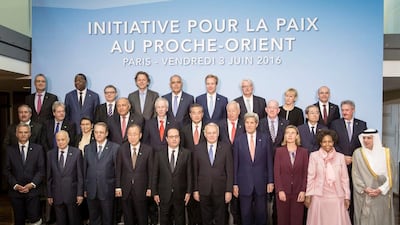PARIS // Leading diplomats from around the world on Friday endorsed French-led efforts to revive peace talks aimed at “fully ending” Israel’s occupation of lands the Palestinians seek for their state.
“A negotiated two-state solution is the only way to achieve an enduring peace, with two states, Israel and Palestine, living side by side in peace and security,” said a joint communique issued after a meeting in Paris.
The meeting was attended by US secretary of state John Kerry, United Nations secretary-general Ban Ki-moon as well as representatives from the Arab League, the European Union and key Arab states. Neither Israeli nor Palestinian representatives attended the talks, which are aimed at laying the ground for a full-fledged peace conference to be held by the end of the year.
Indirect peace talks between the two sides collapsed more than two years ago, and the French foreign minister, Jean-Marc Ayrault, warned that the diplomatic void meant the prospect of a two-state solution to the decades-long conflict was in “serious danger”.
The communique said the status quo was unsustainable and “actions on the ground, in particular continued acts of violence and ongoing settlement activity, are dangerously imperiling the prospects for a two-state solution”.
It called on the two sides to create conditions for “fully ending the Israeli occupation that began in 1967”, a rhetorical shift from what Washington, Israel’s main ally, has previously endorsed. It was not immediately clear whether the shift meant a new focus, and the participants could not outline how they might achieve that goal.
But senior Palestinian official Saeb Erakat said the talks sent a clear message to Israel.
“The Paris meeting is a very significant step and its message is clear: if Israel is allowed to continue its colonisation and apartheid policies in occupied Palestine, the future will be for more extremism and bloodshed rather than for coexistence and peace,” he said.
Mr Ayrault said the talks were focused on the 2002 Saudi-led Arab peace initiative.
Under that proposal, Arab leaders offered to establish full diplomatic relations with Israel in exchange for an Israeli withdrawal from territories occupied since 1967, and the creation of a Palestinian state.
At the time, the plan was largely ignored by Israel, but Israeli prime minister Benjamin Netanyahu said this week he would be open to renegotiating aspects of it with the Palestinians.
Speaking after the meeting, Saudi Arabia’s foreign minister, Adel Al Jubeir, rejected this idea, saying the Arab peace initiative already contained “all the elements for a final settlement”.
“To argue that the Arab peace initiative should be watered down to accommodate the Israelis is not a wise approach,” he said.
“It provides Israel with a lot of incentives and it’s incumbent on the Israelis to accept that.”
Mr Ayrault said the meeting agreed to set up teams by the end of the month to work on economic and security incentives for the Israelis and Palestinians for reaching a deal.
In his opening speech, French president Francois Hollande said: “Our initiative aims at giving them guarantees that the peace will be solid, sustainable and under international supervision.”
Mr Kerry was non-committal when asked if he would support an international conference later this year, with Israelis and Palestinians attending.
“We’re just starting, let’s get into the conversations,” he said.
Israeli prime minister Benjamin Netanyahu has rebuffed the French initiative. Mr Netanyahu’s spokesman David Keyes said on Friday that “peace is not going to come through imposition”.
Palestinian president Mahmoud Abbas has welcomed France’s efforts, in part because it could potentially end a two-decade-old US monopoly on mediation. Palestinians have long complained that the US heavily favours Israel and cannot serve as an honest broker.
The Palestinians seek to establish a state in the West Bank, Gaza Strip and East Jerusalem, lands Israel captured in 1967.
In 2012, the UN General Assembly overwhelmingly recognised a state of Palestine in these boundaries, though setting up an actual state would require a deal with Israel.
* Associated Press and Agence France-Presse

